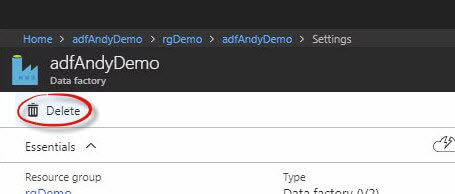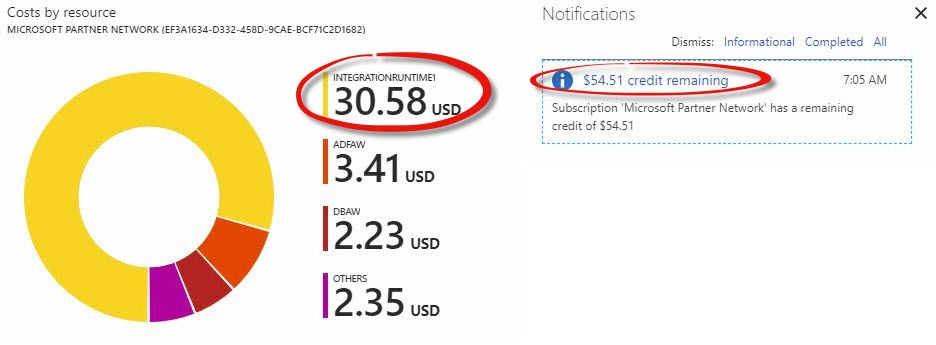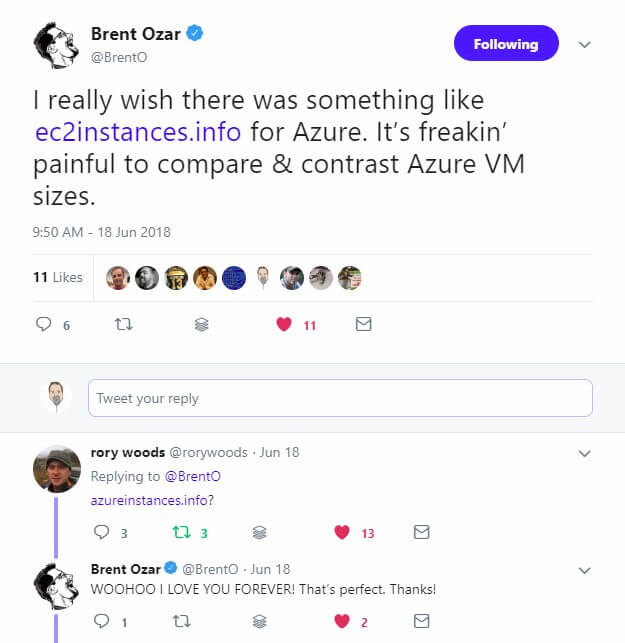 It’s true: the cloud costs money.
It’s true: the cloud costs money.
Yesterday, when I logged into my Azure Portal to set up an Azure Data Factory Integration Runtime for my presentation, the balance for my Azure free subscription (which allows me $100USD per month) was sitting around $82USD. This morning, after leaving a demo instance of ADFIR running overnight, my balance has dropped:
I absolutely love the cloud! This is why I’ve been delivering webinars about the cloud and blogging and presenting about Azure Data Factory.
I would just like to clarify a few things:
The Cloud Is Not Free
This much is true. And while the cloud can save enterprises – especially smaller enterprises – lots of cash on “burst-y” workloads via scale-on-demand – the cloud can actually cost more money when unneeded services are accidentally left running.
The Cloud Will Not Fix Bad Code
In a previous consulting life, a customer contacted us and asked for an evaluation of their architecture. They were attempting to scale the business and encountering… obstacles. A team looked over their software and database designs and recommended a rewrite of their custom code. We supplied a proposal (including an expensive estimate) to deliver the re-architecture, redesign, and rewriting of their code.
They felt the price was too high.
We understood, so we countered with a proposal to coach their team to deliver the same result. This would cost less, the outcome would be the same, and their team would grok the solution (because their team would build the solution). The catch? It would take longer.
They felt this solution would take too long.
We understood, so we offered to help in any way they would allow. The company sought help from other firms. A competing consulting firm offered to migrate their code and databases to a cloud provider. The company liked this solution and embarked on a migration.
The migration succeeded.
It took longer than expected.
The company hemorrhaged cash and clientele throughout the process, and is now a fraction of its previous size in people, clients, cash flow, and profit.
The lesson? Migrating to the cloud wasn’t a bad move for them.
Ignoring the advice of experienced architects was a bad move for them.
Did this client need to move to the cloud? Perhaps. More than anything, this client needed to pay off a tremendous amount of technical debt. By the time we were called, they were well into technical inflation and slipping into a technical depression.
Yes, the cost for a fix was high.
No, the cost for a fix wasn’t as high a price as the costs they have paid for not fixing their code. And…
… the cloud did not fix their bad code.
Heartbreaking
This was heartbreaking to witness. We could have helped them. Why were we unable to help them? We told them the truth; our competition told them what they wanted to hear.
As Brent Ozar pointed out in his post titled What It’s Like to Work for a Bad Contracting Company:
See, bad contracting companies have a huge sales force that goes out and asks customers, ‘Hey, what problems are you having? Sure, we can solve those. Just sign here.’ They make impossible promises about their – well, YOUR – capabilities and timelines.
Brent is right. This is why I ask, “Are you getting the best technical help available? or are you being sold technology by the best sales people?” There is sometimes a difference between consultants who are good at sales (or who hire good sales people) and consultants who are good at technology.
I’m going to take that one step further:
The very best technologist – the one most able to solve your problem for the lowest cost – may be someone who personally irritates you and who charges an hourly rate higher – perhaps multiples higher – than the competition.
Allow me to be (more) blunt:
- Did the company in the (true) account above believe they were going to save money?Yes, they did.
- Did the company in the (true) account above save money?No, they did not.
In my post titled A True Story of Value vs. Hourly Rate I share another true story of how our awesome, experienced team at Enterprise Data & Analytics was able to deliver value to a client. Even though we charged more per hour than the competition we delivered more value. How do we know?
The client did the math.
I’m writing this post to beg you to also do the math.
I’m writing this post to ask you to buy consulting services (if you need them) and not just be sold consulting services (whether you need them or not).
I’m writing this post to let you know that the cloud is awesome. But the cloud is not free.
“How Much Does Azure Cost?”
I hear this question a lot and it is difficult to answer. You can certainly browse over to the Azure Pricing Page to learn more. The difficulty is estimating how many __U’s you are going to use (see what I did there?).
Brent asked a really good question on Twitter and got this awesome answer:
The website is azureinstances.info and it. is. awesome.
How to Fix Being Charged for an Unused ADF Integration Runtime?
Stop ADF IR:
Delete unused cloud resources:

Peace.
Learn More:
Free Webinar – The Azure Data Factory Controller Design Pattern – 28 Jun at noon EDT
Honored to Present an SSIS and ADF Precon at Data Platform Summit 2018!
Expert SSIS – Live, Online, 2.5 Days – 10-12 Sep 2018 – delivered in cooperation with Brent Ozar Unlimited
Honored to Deliver Intelligent Data Integration – a PASS Summit 2018 Precon




Not really a cloud thing, but a tech consulting thing.
That customer is being penny wise and pound foolish. I see this all the time. All the time. ALL THE TIME. There is always someone out there that says “2 weeks and $2k.” and it is never delivered in that time frame or at that cost.
The ultimate problem is “bad customers.” If you are ripe for teaching and being coachable, you will do well. If you are not coachable, then the lesson of the bad experience falls on deaf ears.
Btw, I agree with you completely. 🙂
Thanks Wallace!
It’s always good to hear from you, sir. Thank you for reading my blog and for sharing your thoughts!
:{>